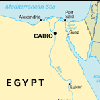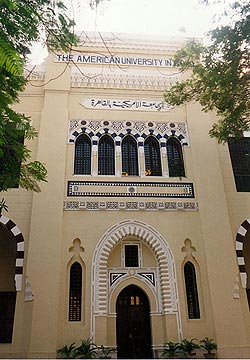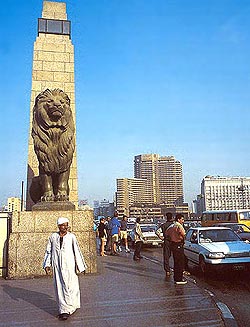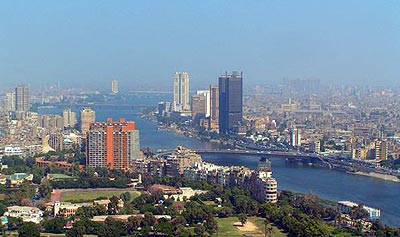 See Egypt's location in North Africa |
To start with, Arabic differs from English in that it has its own script and is read from right to left. It is also a diglossic language, meaning that it has a main, or "high," dialect that most educated people understand, called Modern Standard Arabic (MSA) in English or "fusha" in Arabic, as well as a multitude of local dialects, called "daraja" or "amiyya" in Arabic, that vary from region to region.
MSA is the language spoken in universities and on the news, the language that contemporary books and poetry are written in, and the language that most foreigners learn in their textbooks. Amiyya is the language that people grow up with, speak on the street, and bargain with at the market. Since the amiyya can vary greatly, they are often unintelligible between dialects, which means that it can be difficult for a Syrian to talk to a Kuwaiti, or an Egyptian to chat with a Saudi. In fact, when an Iraqi friend of mine was dating a Moroccan, they conversed mostly in English.
So unfortunately, a good education in MSA will get you only halfway toward Arabic fluency. Although most Arabs understand the high dialect, very few of them speak it. I have been studying Arabic intensely for several years and am constantly trying to practice my Arabic, but it is often received with laughter by native Arabs. I was once told that speaking MSA on the streets of an Arab country would be like walking into an American McDonald's and ordering a Big Mac in Shakespearean English. In spite of this, most American universities conduct their Arabic programs entirely in MSA. This means that often when I speak with Arabs they can understand me perfectly, but I have no idea what they are saying.
 The American University in Cairo teaches approximately 4,800 Egyptian and other Arab students in addition to non-native speakers who come to learn Arabic from the Arabic Language Institute. |
Applying for the CASA scholarship required a lot more effort than any other scholarship I have ever applied for, and I was a little surprised that I ended up getting it. In addition to the usual forms, essays, transcripts, and letters of recommendation, there was also a required physical (with tuberculosis test), a four-hour-long written Arabic exam, and finally a 20-minute oral language-proficiency interview by phone.
I knew that I had done well up until the exam, but that my phone interview left something to be desired. Having spent nine weeks last summer speaking only in Arabic, I am pretty comfortable with speaking and listening; however, that does not mean I'm eloquent. My interviewer asked me about myself, my family, what I studied - and I was fine there, but at the end he broached a "higher-level" topic, in order to gauge my vocabulary breadth.
The question he asked (in English) was whether Third World countries should focus more on developing economically or on preserving the environment. Now, this is a topic that I find challenging to discuss in English, not just in Arabic. As I finally stuttered out an answer, I realized that I didn't know the word for "harm." I ended up saying something like this:
"I think it must be found a balance, in the middle of economic development and the environment. Some companies is good for environment, they develop without . [long pause] . wounding it."
In spite of this less-than-stellar performance, I woke up in March to an acceptance e-mail in my inbox. Suddenly I realized that I had been focusing so intently on figuring out how to get to the Middle East that I hadn't spent very much time thinking about what my life would be like once I arrived.I immediately began to read everything on the Web about Egypt for study-abroad students, travelers, and expatriates. Although I have traveled as a tourist to Europe, Mexico, and China, I experienced culture shock for the first time as I sat in front of my computer, reading about Egypt.
 Ancient and contemporary, traditional and modern, coexist throughout Cairo. |
One of the other delightful facts I learned in my Web wanderings has to do with laundry: apparently, Egyptian laundry services just tear your clothes to pieces. In fact, they recommend you hand-wash anything delicate or even anything containing elastic if you want it to last more than three wash cycles. Oh yeah - did I mention that I am arriving at the very beginning of summer, when low temperatures are in the 90s and highs are well over 100 degrees? I imagine all my clothes are going to have to go through many, many wash cycles.
The housing literature also advises students who are looking for apartments off-campus - as I am - to check with landlords to see if overnight guests of the opposite sex will be allowed, "as this has caused significant problems in the past." Somehow, I get the feeling that this will be a much different world from my very liberal upbringing in Northern California.
In spite of all this, as a speaker of Arabic and a prospective year-long resident, I am hoping to see a side of Cairo that most tourists don't have access to - inside homes, workplaces, and classrooms - and share that experience with readers back in Berkeley. I have never been to the Middle East, and I am excited to see how it will match up with my hopes and expectations.
I am also nervous on several counts: I am curious as to how I will fare as a "Western girl," with all my Western values and expectations, in a society that will consider me an oddity and perhaps a threat; I am anxious about what living in a so-called Third World country will be like; and I am worried about being away from my friends and family. Still, this kind of experience is a once-in-a-lifetime opportunity, and I am looking forward to it immensely.
— Pamila
Pamila Pengra graduated from UC Berkeley in May 2005 with a
B.A. in linguistics, concentrated in Arabic.





